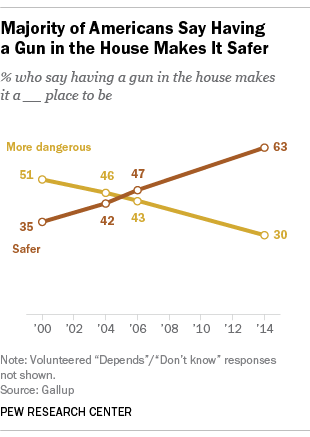Republicans may be losing gay marriage as a scare issue, but whoever gets their presidential nomination next year is sure to raise the specter of gun confiscation, loudly and repeatedly. There is no chance that Washington will pass stricter gun control laws in the next few years, but how many voters know that?
In a December survey, “more Americans say that protecting gun rights is more important than controlling gun ownership, 52% to 46%,” writes the Pew Research Center’s Andrew Kohut. This is the first time the “gun rights” side prevailed since Pew began asking the question in 1993. Kohut notes that gun rights are more popular even though crime rates are down significantly since the early 1990s.
And it’s not because people see safer streets and think it’s best to leave the laws alone. In a reversal, it’s the people most concerned about crime who are the least likely to support restrictions: “just 37% of those who now say crime is increasing say they favor stricter gun control, compared with 78% who said the same in 1990.”
Kohut speculates that “the nature of news coverage, reality TV and political rhetoric” may be contributing to Americans’ “dire” view of a more violent society, which is not supported by crime rates. He notes that “despite crime statistics holding near 20-year lows,” 63 percent of respondents in a Gallup survey last fall said “there [is] more crime in the U.S. than there was a year ago.” (But that’s a pretty stupid question. I’m well informed on crime trends, but I’d be uncertain how to answer that Gallup question. I know that crime rates have fallen sharply over the past two decades, but I’m not so sure about the past year. Things fluctuate.)
Are people more supportive of gun rights because of generalized fear? My guess is that a loss of faith in law-enforcement agencies is also a factor, and maybe a growing alienation from government overall. Many Americans are wary of the very police officers that are charged with protecting them, thanks to the revelation of aggressive tactics toward civilians and, in the worst cases, the deaths of unarmed black men. A reluctance to call the police in dangerous situations may account for one shift found in the Pew survey: “Over the past two years, blacks’ views on this measure have changed dramatically. Currently, 54% of blacks say gun ownership does more to protect people than endanger personal safety, nearly double the percentage saying this in December 2012 (29%).”
In another Gallup survey last fall, 63 percent of Americans said having a gun in the house makes it “a safer place to be,” up from 35 percent in 2000. This perception puzzles public-health professionals like David Hemenway, who wrote a Los Angeles Times op-ed comparing it to climate-change denial. He says that the science overwhelmingly supports the idea that guns in a home increase the danger to its inhabitants, in particular leading to much higher suicide rates.
But getting a gun is doing something. Americans are going crazy with the idea that we have to take more control over our lives and our families’ welfare. It’s our responsibility to plan for retirement, to get our kids in the right schools, to decide whether when and whether to get vaccinations, to come up with out own diets that may or may not be familiar to our cavemen ancestors… It’s become more acceptable to suggest that people are in poverty because they weren’t responsible and didn’t plan ahead. If you’re sick, it must be because you didn’t take the right precautions (use hand sanitizer!) or even because you have a defeatist attitude.
This kind of thinking can kick in when you hear about crime, either on TV or from your neighbors. Getting a gun seems to be a way to take some kind of preventive action, despite all the new risks that guns introduce. It’s an alternative to putting all your trust in the police—or God, or fate.
There is a ceiling to gun ownership in America. Guns are never going to be as popular in crowded cities. No one wants people packing heat on the subway. Maybe because I’ve always lived in areas with low rates of gun ownership, I still can’t grasp the idea of open-carry laws. Why would I go into a Starbucks or a Chipotle or anywhere there’s someone carrying a gun? How am I supposed to tell that it’s a “good guy” toting that rifle? (I can think of possible responses, none of them good.)
But the majority of America thinks of guns in the same way they think of those little bottles of Purell. Forget the statistics on how effective they are. They give a feeling of control, and few political candidates are going to question that.








